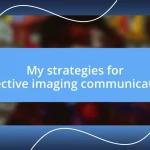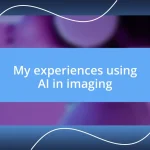Key takeaways:
- Somatic gene editing offers the potential to treat genetic diseases without passing changes to future generations, raising ethical questions about access and enhancement.
- The author’s passion for gene editing was fueled by personal experiences with loved ones suffering from genetic disorders, motivating a commitment to make impactful changes in healthcare.
- Future implications of gene editing include potential eradication of hereditary diseases, but also concerns about unintended societal and ecological consequences, emphasizing the need for ethical considerations and equitable access.

Understanding somatic gene editing
Somatic gene editing refers to the modification of genes in somatic cells, which are all the body’s cells except sperm and egg cells. This means that changes made through this technique won’t be inherited by future generations, making it a focused approach to treating diseases. I remember when I first learned about this distinction; I was struck by the ethical implications. It’s fascinating to consider: if we have the power to alter our own genes, should we?
As I explored somatic gene editing deeper, it became clear to me that its potential is both exciting and daunting. For instance, imagine having the ability to correct genetic mutations related to debilitating diseases like cystic fibrosis or muscular dystrophy. It not only sparks hope for patients but also raises questions about access and equity—is everyone going to benefit from these advancements?
I often think back to my own struggles with a chronic illness that could potentially be influenced by gene editing. The thought of living without those limitations is exhilarating. But then there’s always that lingering question: at what point do we draw the line between therapeutic interventions and enhancements? Understanding somatic gene editing isn’t just about the science; it’s woven with personal stories, ethical considerations, and the collective future of healthcare.

My journey into gene editing
My journey into gene editing began somewhat unexpectedly during my graduate studies. I stumbled upon a seminar discussing CRISPR technology, and it ignited a fire within me. I remember sitting there, captivated by the idea that we could fine-tune the very code of life. The blend of science and possibility left me buzzing with excitement. It was as if I had discovered a new language; I wanted to learn every dialect of gene editing.
As I dove deeper into my research, my perspective started to shift. I realized it wasn’t just about the mechanics of gene editing; it carried profound implications for human life. I couldn’t help but envision my own family history when I learned about potential treatments for hereditary conditions. The thought of alleviating suffering—of lifting a burden not just for myself, but for future generations—felt incredibly empowering.
Through hands-on experience in the lab, I encountered both triumphs and setbacks. My first attempts at somatic gene editing were nerve-wracking; I vividly recall the feeling of anticipation as I awaited results from my experiments. Each small success felt monumental, reaffirming my belief in the ethical necessity of this work. Yet, there was always a voice in my head challenging me: How do we ensure these advances benefit all, not just a fortunate few?
| Aspect | My Experience |
|---|---|
| Initial Encounter | Fascination with CRISPR technology at a seminar |
| Shifting Perspective | Awareness of profound human implications, considering family history |
| Hands-on Experience | Nerve-wracking experiments, excitement over small successes |

Initial motivations for gene editing
My initial motivations for gene editing were deeply rooted in my desire to make a tangible difference in the lives of others. I vividly recall a rainy afternoon spent with a dear friend who was battling a genetic disorder. As I listened to her stories of frustration and pain, I felt a surge of urgency to explore solutions. I realized that gene editing could potentially pave the way towards new treatments that could transform her life, transforming hope into reality.
Here are some factors that fueled my passion for gene editing:
- Personal Connection: Witnessing loved ones suffer from genetic diseases made the science feel urgent and personal.
- Desire for Impact: The possibility of alleviating pain and suffering in others drove my commitment to the field.
- Curiosity and Exploration: I was intrigued by the science itself and the potential it holds for reshaping our understanding of health.
Each of these motivations intertwined, enhancing my drive to dive deeper into this cutting-edge field. I found myself staying up late, poring over research articles, and engaging with the community – all the while nurtured by the fervent belief that somatic gene editing could be a key to unlocking better health outcomes for countless individuals like my friend.

Ethical considerations in gene editing
When navigating the landscape of gene editing, I often find myself wrestling with the ethical dimensions it entails. One day, while discussing the potential of gene editing with a fellow researcher, I couldn’t shake the thought: if we can alter genetic traits, where do we draw the line? It’s unnerving to contemplate how such power could lead to unintended social inequalities, further widening the gap between those who can afford these advancements and those who cannot.
I recall an uncomfortable conversation about “designer babies”—the idea of selecting traits before birth. It sparked a mix of fascination and dread within me. What if parents start choosing not just the physical attributes, but also traits like intelligence or athleticism? It feels like we’re stepping into a realm where we’re not just editing genes, but potentially also editing the very essence of what it means to be human. I wondered then: are we prepared for the societal implications that could arise from such choices?
One of the aspects I deeply ponder is the long-term effects of gene editing. While somatic editing aims to correct mutations for therapeutic purposes, I often ask myself—what do we really know about the repercussions? I remember reflecting on this during a lab meeting when a colleague shared results from an experiment that appeared promising. Yet, the underlying questions of safety and long-term impact resonated in my mind. Are we prioritizing immediate benefits over the health of future generations? Balancing innovation with caution is critical, and I believe ongoing dialogue around these ethical considerations is essential as we move forward.

Challenges faced during the process
During my journey with somatic gene editing, I encountered a myriad of challenges that were sometimes disheartening. Early on, I found that navigating the regulatory landscape was far more complicated than I had anticipated. I remember the frustration of trying to understand the myriad of guidelines while feeling overwhelmed by the pressure to ensure compliance. It often left me wondering if I had the necessary knowledge to effectively push forward my research.
Additionally, I faced significant hurdles during experimental designs that balanced creativity with necessity. There were countless moments when expected results turned out to be wildly different from what I had envisioned. I still chuckle, albeit with a hint of exasperation, about an experiment where I mistakenly combined two techniques, hoping for innovative results. Instead, I ended up with data that was almost nonsensical. It made me realize how crucial it is to maintain flexibility and resilience in this field.
Another pressing challenge involved garnering support from both the scientific community and the public. I recall one particularly challenging event where I presented my findings to a panel of skeptics who were understandably wary of gene editing’s implications. As I stood there, their tough questions made me reflect deeply on my motives and the broader impact of our work. It’s moments like these that pushed me to articulate not just the science, but the compassion behind it, driving home the importance of transparency and dialogue in moving this promising field forward.

Future implications of gene editing
As I think about the future implications of gene editing, I can’t help but feel a mix of excitement and caution. I recall an insightful conversation with a mentor who emphasized the possibility of eradicating hereditary diseases. Imagine a world where conditions like cystic fibrosis or Huntington’s disease could be virtually eliminated! Yet, that same discussion left me with a lingering thought—what happens if we push too far and inadvertently create new problems? It’s a fine line we’re walking, isn’t it?
There’s also the matter of unintended ecological impacts that I often reflect on. When gene editing can potentially alter not just human genomes but also those of plants and animals, I envision a future where ecosystems could be disrupted in unforeseen ways. I remember when I attempted a project focused on modifying a plant for pest resistance; it worked beautifully on a small scale, but what would happen if it were released into the wild? Would it outcompete native species, leading to unforeseen consequences? These questions highlight the need for thorough testing and ethical consideration before implementing changes on a larger scale.
Moreover, the potential to change societal dynamics fascinates and worries me simultaneously. I vividly recall an engaging debate with colleagues about access to gene editing technologies. If only a privileged few can afford these advancements, could we see a society divided not just by wealth, but enhanced capabilities? I find myself pondering—what measures can we take to ensure equitable access to such transformative options? The road ahead is fraught with challenges but also brimming with opportunities. Engaging in these conversations is vital as we navigate this brave new world.














